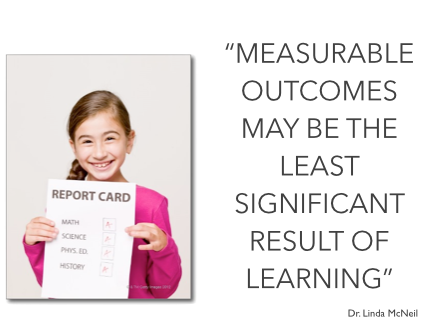Assessment continues to occupy much of my thinking and experimentation both as a teacher and in broader conversations with educators. If you search my blog categories you’ll see I’ve written specifically about assessment over 50 times. They represent some of the most challenging ideas and change since many practices and beliefs are both deeply ingrained in institutions and also because it’s a complex subject. I don’t claim to have the answers but I have thought about, explored and implemented many ideas, some that I like, others I’m still exploring.
One area that I’m still struggling with is how much time and effort I put into grading. I believe mostly in feedback. I try to give and create an environment where students reflect deeply and I try to provide timely and insightful feedback and comments. I also work to have them seek feedback from others as well. This is where the bulk of my time is spent. Because of institutional requirements, I still need to provide a grade. I believe in self assessment and grading. I don’t think it’s unreasonable to ask every learning, even our youngest to assess themselves. This is essentially what reflecting entails. However, moving from a descriptive assessment to a numerical one is difficult for all of us. Rubrics are supposed to help and for many this is useful but I struggle with them. All of this effort and struggle to me seems largely a waste of time. This is essentially ourselves being tied to old forms of thinking that says learning must be measured with a number.
And yet….
I’ve asked my students to use this template after each assignment:
After each module’s assignment you’ll be asked to submit via dropbox, your personal self assessment. Here is a simple template to follow. For each heading consider writing 2-3 sentences at most.
What I did well this week: Write about your feelings on how well you communicated or completed the assignment
What I struggled with: Think about any struggles related to the concept, the relevance or any technical issues you may have had.
My interactions: This is where you can reflect both interactions within your post or with interactions you participated in or observed with your classmates. Focus on comments of others that made you think.
My grade: Based on the guidelines, how would you grade yourself out of 10. In general, this is how I would like you to approach your grading:
10- Perfect. Not only did you hit all the guidelines but you did so to the highest level. (Note, I doubt many will hit this but I may be surprised)
9-Outstanding. Hit all almost all the guidelines and those that didn’t may not have added to the post. Something you would be happy to share with your colleagues.
8-Solid. Met the majority of the guidelines. Felt like you covered all your basis fairly well.
7-Good. Nothing amazing but still useful and at the level of a grad student
6-Okay. Mostly covered the content but lots of holes and missing guidelines.
5-Barely acceptable. You can make the argument that you’ve fulfilled the requirements but at a minimal level. Easy to tell that it’s rushed or lacks much depth or effort.
How I might improve this assignment or module: If you have any suggestions, please add them.
This works really well. I’ve promised my students that unless I really disagree, whatever grade they give themselves is the grade they will get. Last term I had a few students constantly giving themselves 10 on assignments. They felt like they had completed all the requirements of the assignment. I could certainly see and commenting about ways they could improve or suggestions for future work. If 10 meant perfect, they weren’t perfect. In fact I felt other students actually did a better job and yet they only gave themselves an 8 or 9. Not only did the discrepancy bother me but the fact that I was bothered by it, bothered me. (I added the scoring guide after my course as a result of my angst)
And yet..
If I really am trying to downplay the importance of grades, should this matter? If I worry about this or try and resolve it, I fall back into the old habits of using grades to rank and sort students. In the end, if one student gives themselves a 10 and another an 8 and if I leave them as is or don’t change them will it impact learning? Not likely.
So I continue to struggle with the right thing to do here. I want my students to own their learning and assessment. My job is to provide meaningful feedback and opportunities to improve. I’m not sure I have this right and I know many of my students feel like that grade is a big deal. I have a new course that starts in a couple of weeks. I’m still not sure how or if I’ll change my practices. Any insights or thoughts are more than welcomed.
